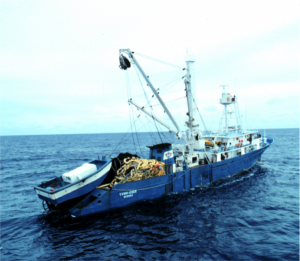By Kailani Clarke
BOSTON — Seafood represents 20% of the protein source for three billion of the globe's inhabitants, and is the primary source of income for 10% of the world's population, according to the United Nations Food and Agriculture Organization. But climate change and its effects could threaten the very existence of those whose lives and livelihoods depend on the world's fisheries, as waters warm and sea dwellers move away in search of more hospitable environments.

Biologists, economists, geographers, policy experts, and others are hard at work trying to understand the extent of the problem and come up with solutions.
A recent University of California, Santa Barbara, study of 912 current worldwide fish populations, also called fish stocks, found two main likely effects of climate change on fisheries. One is a change in productivity, with the numbers of fish shrinking or growing. The other is a shift in range, with fish stocks moving out of current regions into more suitable ones, often crossing international borders as they go. Such changes in range can prompt fishers to overharvest if they see signs that a stock is beginning to move away from them.
Lead researcher Christopher Costello, a resource economist, and his team arrived at their conclusions by using computer modeling to predict the effects of climate change by 2100. They then tested how changes to current fishing strategies might lessen those predicted effects. The computer models took into account the rate of greenhouse gas emissions and the resulting heating effect on the planet. Whereas some fish species were predicted to have improved productivity, the majority — 69% — showed a decline. In addition, 51% of those species also showed potential for one or more shifts into and out of a region's waters.
Proposed strategies to counter such effects include limiting how much fishers can take relative to an area's total mass of fish available, also called biomass. Other changes could include international agreements to prevent overharvesting of shared stocks. Such adjustments could pay off, leading to almost a doubling in fisheries profit, a 39% increase in harvest, and a 54% increase in biomass, according to calculations. In other words, that means more stable fish stocks and higher yield, benefiting both fisheries and fishers.
"Adapting is always better than not adapting," Costello said. "That's true regardless of the climate scenario. Even if there was no climate change, that would be true."
Another study by the Environmental Defense Fund came to similar conclusions. Lead researcher Jake Kritzer and his team tested three scenarios: 1) catching fish at a fixed rate regardless of climate change or current biomass, 2) fishing at a rate dependent on prevailing biomass but not climate change, and 3) fishing at a rate based on both biomass and climate change. Simulation over 100 years showed that adjusting harvest rate based on prevailing biomass yielded higher productivity in fish stocks.
Translating such solutions from a closed research environment to the open seas will require not just scientists but policy makers and others, the researchers say. For example, international coalitions, community collaborations and rules could be put into place that determine who has rights to specified fish stocks, and limit how much fishers can harvest from a certain area over a given period.
"These control rules (and) catch limits are absolutely fundamental, and in my view, where science most directly confronts policy," Harte said. "And we do know that if international cooperation leads to better fisheries management … If we get it right, it will lead to larger fish populations, more stable fisheries, and higher current benefits than if each country manages its shared fishery alone."
Kailani Clarke is a freshman at Washington College in Chestertown, MD. She intends to declare a double major in environmental science and anthropology. She writes for Chesapeake Bay Magazine, Washington College's Department of Media Relations, and the Washington College Center for Environment and Society.
